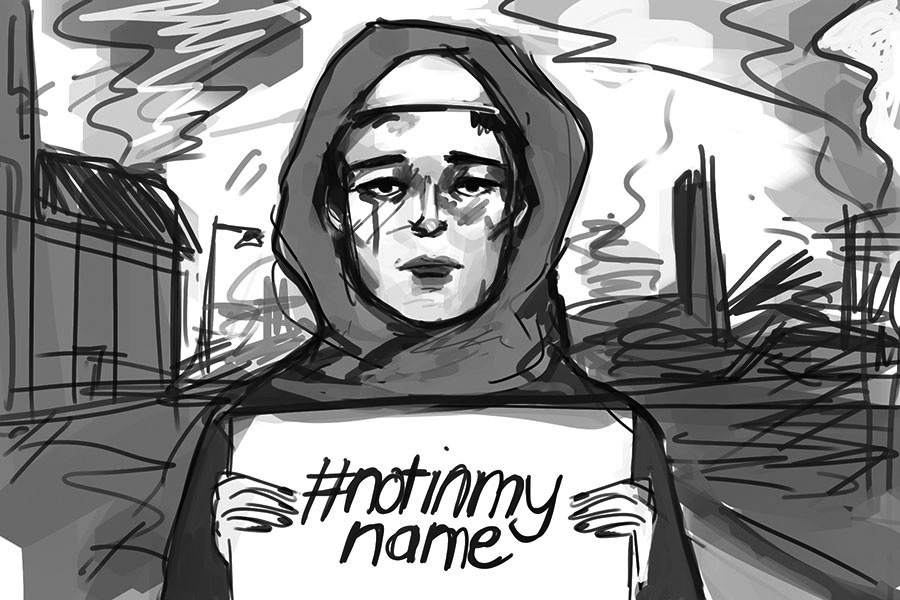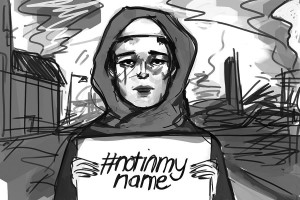Muslims shouldn’t take blame for ISIL
Though Muslims worldwide gathered this past weekend to celebrate Eid al-Adha, come Monday they can expect to return to the same conversations being had about the status of their faith on the world stage. From Bill Maher’s offensive statements comparing Islam to the “mafia” and Reza Aslan and Ben Affleck’s subsequent arguments against such bigoted generalizations, Islam’s portrayal in the Western media has been the subject of recent controversy.
Such conversations about Islam, however, didn’t start with Bill Maher. In fact, they began on Sept. 24 when President Barack Obama addressed the United Nations General Assembly, urging the world to band together amid new U.S. airstrikes against ISIL, or the Islamic State of Iraq and the Levant, militant targets in Iraq and Syria. Midway through his speech, President Obama called upon Muslim communities in particular to reject ISIL’s terrorism, saying, “It is time for the world — especially Muslim communities — to explicitly, forcefully, and consistently reject the ideology of organizations like al Qaeda and ISIL.”
Though this particular appeal to Muslim communities might have fallen on deaf ears for most Americans, it prompted one simple question for American Muslims: Mr. President, where have you been?
The current military action against ISIL doesn’t call for Muslim condemnation of the fundamentalist organization’s terrorist activity. In fact, Muslims worldwide have publicly disavowed ISIL, or ISIS as it is also known, long before the United States formed a global coalition to take action against it. From the Council on American-Islamic Relations to the Muslim Public Affairs Council, several Islamic organizations, leaders and scholars have already denounced ISIL as “a danger to Islam” and “un-Islamic and morally repugnant.” Muslims worldwide have even taken to social media to express their disapproval, most notably through the #NotInMyName hashtag, a campaign launched in London by British Muslims condemning the extremist group for attempting to speak in the name of the Ummah, or the Islamic community.
Labeling ISIL as anything but Islamic is not new. Even the president himself emphasized that ISIL is an inherently un-Islamic extremist organization, co-opting the faith of 1.6 billion people for its own goals and interests.
Yet despite this implicit understanding that ISIL does not represent the Islamic community as a whole, the president’s appeal to Muslims to condemn the organization suggests otherwise. Implicit in this request rests the notion that since ISIL masquerades as an Islamic organization, all the world’s Muslims must apologize for them, lest they be accused of supporting ISIL themselves.
Not only is this assumption damning and offensive to Muslims everywhere, but it also gives credence in ISIL’s claim of being an inherently religious organization.
President Obama himself said that no religion condones the killing of civilians. But actions speak louder than words. Though President Obama might have previously emphasized that ISIL does not represent Islam, his call for all Muslims to condemn ISIL terror — much of which is targeted against Muslims themselves — implies that they do. In the same way that ISIL has no right to represent the worldwide Islamic community, President Obama has no right to implicitly shoulder the brunt of ISIL’s actions on the Muslim community’s shoulders.
In an almost immediate response to President Obama’s remarks, the hashtag #MuslimApologies went viral on Twitter, giving Muslims a forum to express their frustrations with the assumed collective responsibility in the President’s speech. Some tweets, such as this one written by Saleem Khan (@sim_ayyk) addressed this frustration head on: “Dont [sic] see why us muslims should be pressured to condemn/apologise for every action good or bad that individuals commit. #NotInMyName.” Others took a more satirical approach, such as Jenan (@WanderD0gs), who tweeted, “I’m sorry for inventing surgery, coffee, universities, algebra, hospitals, toothbrushes, vaccinations, numbers, & the sort #MuslimApologies.”
American Muslims are no strangers to the assumptions and stereotypes that come with their faith. Many of them remember the day they had to start apologizing for the acts of a few fundamentalist extremists who hijacked the World Trade Center and their faith in the same day. But in the same way one would not expect a single religious group to apologize for the acts of a few extremists, one should not place the implicit burden of ISIL’s brutality and terrorism on an entire religious community.
There are 1.6 billion Muslims in the world, and President Obama’s remarks tasked each and every one of them with condemning an organization he himself says does not and should not represent them. The Muslims of the world needn’t apologize for ISIL’s injustices done in their name — but perhaps they deserve an apology.



Islam is indeed a crime against humanity, and its first victims are Muslims.
I think that is why Muslims are so quick and ready to assume victimhood. On a
subconscious level, they feel victimized, but in their search for the cause of
their discomfort they incorrectly identify colonialism, crusades, Jews, racism,
and so forth as the cause.
For a Muslim to face up to the reality of Islam and to admit to oneself that
Islam is the problem means to lose one’s identity. Hence the cognitive
dissonance Muslims experience when Islam is called into question. Hence the scrambling
for excuses and explanations that can convince the Muslims themselves that
Islam is not the problem. And the explanations tend to be colonialism,
crusades, Jews, racism, and so forth.
When cultural Muslims refer to spurious arguments by Islamic apologists as a
counterargument to brush aside direct quotes from the Qur’an and the hadiths,
it is not that they are deliberately trying to to deceive the non-Muslims. They
are desperately clinging to the hope that Islam is not the problem. When they
repeat the talking points of Islamic apologists explaining how Islam is a
religion of peace, their primary aim is to convince (delude) themselves and
make the cognitive dissonance go away at least momentarily, which then removes
the immediate threat to their identity and postpones the inevitable
confrontation.
Unlike most of the Muslim world, Turkey is a country where, thanks to
militantly secularist strains, there are more Muslims who are not completely
enslaved by their Muslim identity. That gives slightly more breathing space for
the individual to break the chains of Islam. Nonetheless, it still means you
have to turn your back on large parts of your cultural heritage and family.
Families in any culture have members who seek to enforce tradition. In Muslim cultures
the conservative members of the family are enforcers of Muslim identity, which
brings along with it the whole can of worms that is the Qur’an and the hadiths.